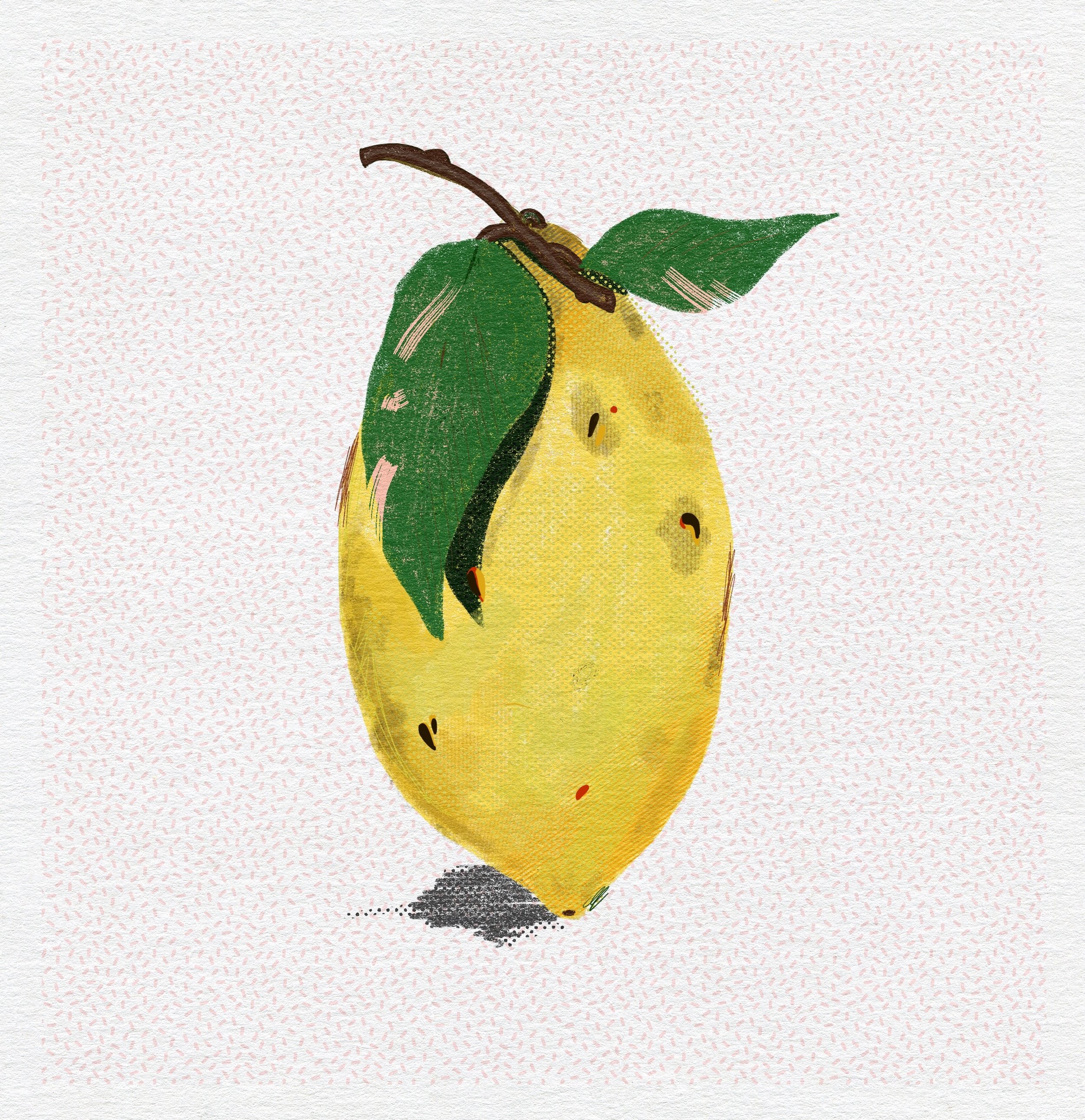Fate Handed Me a Lemon
Image by Flora Grosvenor-Stevenson @floradorianartist
“Fate handed me a lemon but I have made lemonade of it”
- Marshal Pickney Wilder, The King Of Jesters
Our sense of smell and taste that together create our experience of flavour are registered in the oldest parts of our brains. These are the primaeval bits of hardware that we share with the lizards. It is in the recesses of this ancient faculty that memories are made. Our sense of taste and smell, mutually, have the ability to trigger great storms of firing synapses which can fling us back to our most cherished memories. Flavour it turns out is part of our genetic baggage. It fundamentally changed the brain of early man when we swapped the security of the canopy for a life on two feet and hot dinners. It was our evolutionary trade-off for higher thought.
That may all sounds a little science-y but it isn’t. Actually, I don’t think anything to do with flavour is rational. Nothing to do with food and drink can be about facts alone. What I’m trying to say is - the world of flavour isn’t a demonstrable science, in the same way, that there is no assuredly demonstrable way of being a living, worrying, laughing person. We, each of us, are made up of a succession of blurred experiences which intersect at points and diverge at others and that make us who we are. So with that spaghettified mess of indecisive existential bullshit, we come happily to subject of lemonade.
I’m sure you’ve heard the old adage “When life gives you lemons. Make lemonade”. Well, it’s never tasted quite as sharp as it does now. But, lets ignore the elephant in the room vis-a-vis the catastrophic damage done to the hospitality industry in light of Covid-19. In hindsight, I can understand that it may have seemed like the wheels had flown off during lockdown number one when I became urgently obsessed with making lemonade. I’d taken a throwaway figurative remark quite literally. Which I suppose, to a concerned loved one, does look a lot like spilled marbles.
Lemonade is fascinating for so many reasons. If not only for the fact that the exact origin of the lemon itself has not been easy to pin down. Research has clarified though that it owes its lineage to an orange/citron hybrid. Very little has changed in the long, storied history of lemonade from that which we enjoy today. Early records put the precursor of lemonade, Kashkab, to the Mediterranean coast of medieval Egypt. From there it conquered the world and laid the foundational stone for the entire enterprise of refreshments. Lemon, sugar and water. Simple. Yet, it is so much more than these three innocuous ingredients and the potential for deliciousness is myriad. From Egypt to Parisian lemonade ala Compagnie de Limonadiers, Guarapo in latin America, Limonata in Anatolia to the American-style lemonade stands of Charlie Brown. It is an exercise in balance, sour and sweet, which is the primary battlefield of the bartender. Keeping each element in check to find harmony. If you’ve ever mixed a drink badly, which incidentally is the only way to properly learn how to mix a drink well, you’ll know what I mean. Yet here’s the thing; lemonade can never be perfect. It relies as much on the drinker, as it does on the drink.
Which is what makes it infinitesimally more fascinating. You know what I mean, when I say, lemonade. Yet, it’s as different for you as your hair colour may be to mine. It can’t be reduced to something you can understand by a poking, universal rationale, it isn’t a science. It’s people. Who are, for whatever reasons, all kinds of different. So lemonade, in whatever small and inconsequential way becomes a part of a shared cultural experience and the unspoken language of flavour which we all understand. That’s why lemonade is so interesting. It is textured and layered in a tediously human way.
Limonata
I tried a cup of fresh Turkish lemonade on a family holiday outside the Isa Bey Mosque in Izmir, when I was a moody teenager. It was the most refreshing things I’d ever tried and it has stayed with me ever since. I’ve never managed to get it just right but here’s the lemonade I make at home, based on the same recipe.
Grate the zest from the lemons into a bowl. Sprinkle in the sugar and knead for 5 minutes to make a paste, this is a quick and easy way to make Oleo Saccharum. Add 250 ml of warm water and stir to dilute the Oleo Saccharum.
Cut the lemons in half and squeeze out as much juice as you can. Transfer to a jug and set aside. Put the squeezed halves in a bowl, cover with warm water and leave to soften for 1 hour.
Discard the soaking water. Wrap the lemon pulp in muslin or a tea towel and squeeze out any remaining juice, then add this to the jug. Add the Oleo Saccharum. Add 250 ml of water and 270 g of crushed ice, as well as 2.5ml of high-quality orange flower water. Finely chop half the mint the leaves and stir through the lemonade. Refrigerate for 30 minutes. Pour into glasses, top with a few whole mint leaves, and serve. You can use sparkling water in place of still, and if it works great with most white spirits.
Jake O’Brien Murphy
Jake has worked in bars for his entire adult life. He has been nominated for numerous awards, none of which he has won. He's trying to be a writer, even though he doesn't fully understand the semi-colon.
